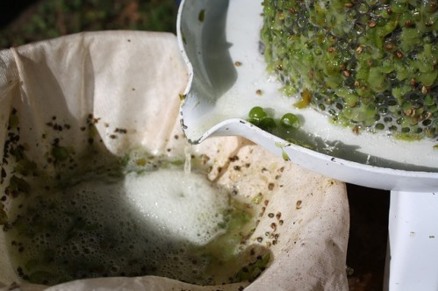Producing food at home

What are the laws governing preparing wine, oil, and legumes at home? How much wine can I make during shemitah? How can I sprout legumes indoors during the shemitah year? Chapter 17 of the Consumer's Guide to Shemitah.
A. Wine
- Private individuals may harvest or buy an amount of grapes sufficient to prepare wine or grape juice for a year (approximately 70 bottles).
- It is permissible to prepare wine employing all conventional methods (squeezing, cooking).[1]
- The branches of the grapevine do not have shemitah sanctity; however, if grapes are still attached to them they are sacred.
- After the wine is filtered (solids are filtered from the liquid), it is permissible to prepare secondary wine, but it is not mandatory to do so.
- It is permissible to age wine as usual.
- The solid left-over residue has shemitah sanctity, since additional wine can be pressed from it. It should be handled accordingly.[2]
- Wine may be pasteurized in a closed container.[3] However, wine should not be boiled only to prevent it from being disqualified if touched by a non-Jew (yayin mevushal), since this adversely effects its taste.[4]
- Wine should not be cooked, as this process reduces its quantity.[5] However, if cooking the wine enhances its quality, it is possible to be lenient.[6] It is permissible to use shemitah wine to enhance the flavor of baked goods and drinks.[7]
B. Oil
- It is permissible to crush olives to produce oil.[8]
- The olive waste does not have shemitah sanctity.
C. Home sprouting
- It is permissible to sprout various plants indoors for the purpose of eating them (such as sprouting lentils on a net), provided that the sprouting is performed in a bowl or other container without holes.[9] While sprouting, care should be taken to avoid mixing different types of sprouts or sprouting various types of plants in close proximity to avoid the prohibition of kila'im.
- When sprouting for educational purposes (such as to show students how plants grow), it is permitted to do so indoors when the plants themselves are nested in containers without holes.
[2] It is possible to leave grape residue uncovered all night. Afterwards, since they cannot be reused (along with other liquids left uncovered all night), they no longer have shemitah sanctity and can be discarded. This follows the opinion of the Rash (8:2); note that many do not accept the leniency that keeping food uncovered at night voids its shemitah sanctity. See Shevat HaLevy 7:224.
[3] Minchat Shlomo §25, at the end; Brit Olam §5:47. Rabbi Eliahu rules that it is possible to pasteurize wine, since this is the standard process of wine preparation today.
[4] Mishpatei Eretz 22:6. However, when done in ways that do not adversely affect the taste of the wine, it seems this should be permitted.
[5] Rambam, ibid., 11:4; Mishpat Kohen §85, s.v. upeirusho. The phrase in the Mishnah is mipenei shemamito (lit. "since this reduces it"). The Yerushalmi is uncertain whether this means that the action reduces the quantity of wine or the amount of people that would want to drink it (since there are people who do not like cooked wine).
[6] Pe'at Hashulchan §24:6 and n. 18; Beit Ridbaz, ibid., §5:6, Kerem Tziyon 13:6; see also Shabbat Ha'aretz 5:3 nn. 46–48. They are lenient, since there is no explicit mitzvah of eating shemitah produce (as opposed to terumah and ma'aser sheni). For this reason, it would be permitted to reduce its quantity and thus also cook it. However, see Hilchot Shevi'it §5, Kise David §§38–39.
From here, we can conclude that fruits and vegetables that are eaten both raw and cooked should not be cooked in a way that reduces their volume, such as to steam them without water, unless this substantially enhances them. This is implied by Mishpat Kohen §85.
[7] Mishpatei Eretz 22:7.
[9] It is permitted because sprouting involves encouraging growth, and is not considered "wasting" the seeds or produce. While the act of sowing during shemitah is generally forbidden, it is permissible when indoors and on detached platforms (a bowl is also considered a detached platform).




